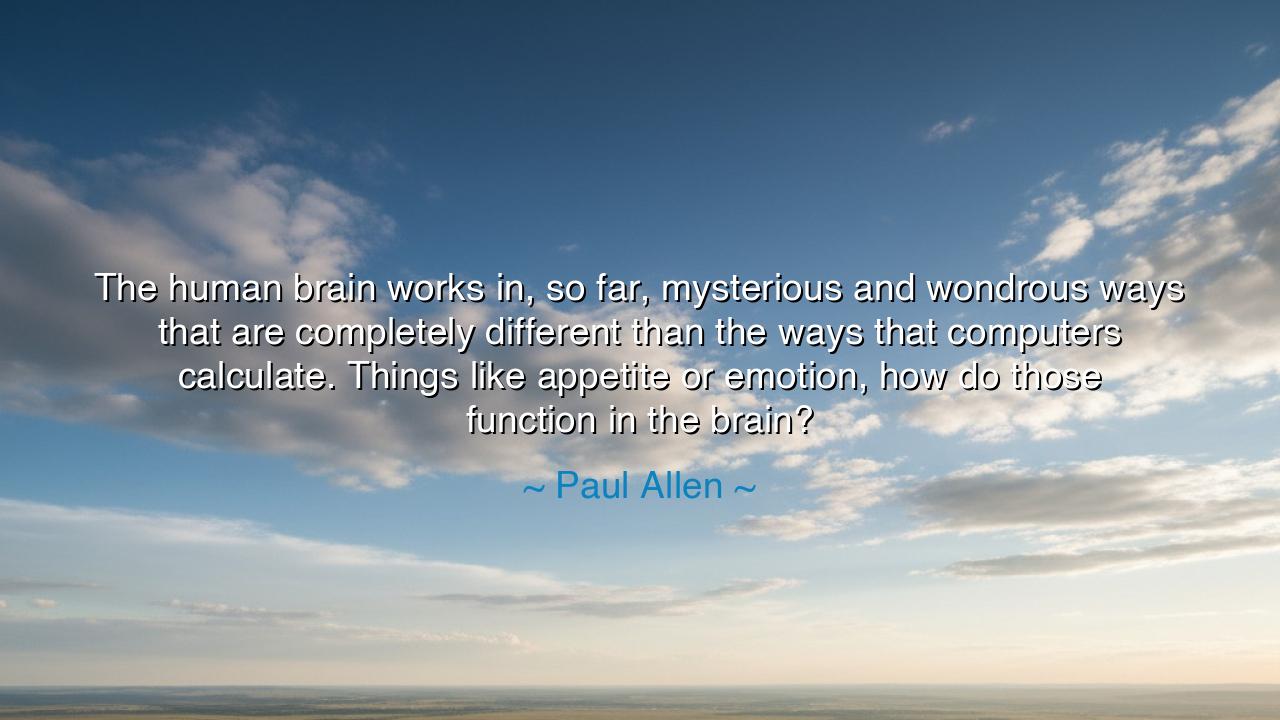
The human brain works in, so far, mysterious and wondrous ways
The human brain works in, so far, mysterious and wondrous ways that are completely different than the ways that computers calculate. Things like appetite or emotion, how do those function in the brain?






"The human brain works in, so far, mysterious and wondrous ways that are completely different than the ways that computers calculate. Things like appetite or emotion, how do those function in the brain?" These words by Paul Allen express a profound reflection on the nature of the human brain, its complexity, and its vast mystery. While machines, especially computers, are capable of executing calculations at lightning speeds, they remain vastly different from the way the human mind processes the world. The brain, with its intricate web of neurons and unquantifiable connections, is a living system of thought, emotion, and experience—elements that machines, despite their growing sophistication, struggle to understand or replicate. Allen's words call us to contemplate the uniqueness of human consciousness, emotion, and the underlying processes that make us who we are.
In the ancient world, thinkers like Plato and Aristotle recognized that the human mind was not merely a logical machine, but a complex and multi-faceted entity. Plato, in his dialogues, explored the concept of the soul and its relationship to reason, emotion, and desire. For Plato, the mind was not just a tool for calculation, but a seat of virtue where the inner workings of human nature—appetite, reason, and spirit—interacted in profound ways. Aristotle further explored the idea that emotion and reason were not at odds, but that each played a vital role in the moral life. What Allen touches upon—the relationship between appetite, emotion, and thought—was a topic of deep exploration for these philosophers, who sought to understand the ways in which the human mind was guided by forces far more mysterious than the mechanical and logical systems we now see in computers.
Consider the story of Socrates, who, though the world around him was filled with great intellectual and mathematical achievements, focused instead on the deeper questions of the soul and the complexities of human nature. Socrates believed that understanding human behavior was not a matter of simple logic, but required wisdom, a deep awareness of the emotional and irrational forces that drive people. For Socrates, and later for Plato, understanding the human mind meant understanding its capacity for both reason and emotion—an understanding that machines and their calculations could never achieve. The ancient Greek philosophers knew that human nature was far more than numbers or equations, and their work laid the foundation for recognizing the complexity of the human condition.
In modern times, Allen’s thoughts on the brain and its mysterious workings mirror the advancements we’ve made in neuroscience and artificial intelligence. Today, we live in a world where computers have become increasingly adept at performing tasks traditionally thought to be uniquely human, such as learning, pattern recognition, and even playing complex games like Go. However, as powerful as these machines have become, they still cannot replicate the profound and nuanced processes of human emotion and thought. Computers can calculate, analyze, and store vast amounts of information, but they do not experience appetite, desire, or emotion. These qualities remain as deeply human as ever, and neuroscientific studies continue to probe the mysteries of how the brain works, how it feels, and how it thinks.
The true wonder of the human brain, as Allen suggests, lies in the fact that it operates in ways far beyond simple calculation. Appetite, which drives us to seek sustenance, and emotion, which influences how we interact with the world, cannot be reduced to algorithms or code. Even the most sophisticated computer cannot feel hunger, experience joy, or understand love the way humans do. The brain is not a mere machine—it is a living, dynamic system that is both influenced by and influences the world around it. These complexities give rise to the unique beauty of human existence—where thoughts, feelings, and desires coexist in ways that machines cannot comprehend or replicate.
This realization speaks to a deeper truth about humanity: we are not simply the sum of our neural impulses or biological functions. Our minds, in their mysterious workings, are not just machines. They are repositories of experience, emotion, and consciousness. As Plato once argued, the mind is not merely a reflection of the physical world, but a realm of ideas, where deeper truths about the human spirit are forged. In this sense, the human brain is not just a calculator of information, but a creator of meaning—something no computer can do, no matter how sophisticated.
The lesson Allen’s quote teaches us is one of humility in the face of our technological advancements. While we must continue to innovate and evolve, we should never forget the uniqueness of the human experience. The brain, in all its complexity, holds mysteries that will never be fully replicated by machines. In our pursuit of progress, let us remain mindful of the qualities that define us—not just as thinkers, but as feelers, creators, and beings capable of great depth. We must not lose sight of the human heart and its capacity to experience life in ways that cannot be reduced to data points or algorithms.
In practical terms, this means that while we embrace technology, we must also nurture and celebrate the human aspect of our lives. We must engage in reflection, connection, and emotion, recognizing that the true value of life lies not just in what we know or what we can do, but in the meaning we derive from our experiences. Let us honor the mysteries of the human brain, and through our wisdom, use technology not to replace what makes us human, but to enhance our ability to understand the profound complexities of the mind, the heart, and the soul.






AAdministratorAdministrator
Welcome, honored guests. Please leave a comment, we will respond soon